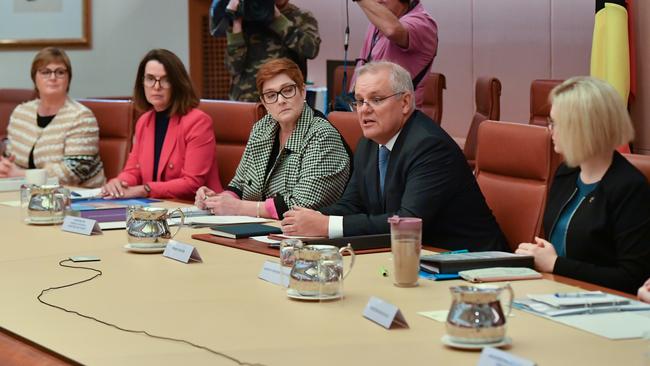Jobs to get priority over parental leave
The Morrison government has ruled out any changes to the paid parental leave scheme in next month’s budget.

The Morrison government has ruled out any changes to the paid parental leave scheme in next month’s budget, which will be used as an economic blueprint to take to the federal election, saying Labor’s more ambitious plan will “put a brake on the economy”.
The attack came as Scott Morrison convened the first meeting of his cabinet taskforce on women’s safety and economic security, saying the group of female ministers would help frame the budget.
It marked the return of former defence minister Linda Reynolds, who was given the government services portfolio in last week’s reshuffle after she took extended medical leave following pressure over her handling of former Liberal staffer Brittany Higgins’s rape allegation.
As the government tries to contain a backlash over rape and sexual harassment allegations and Labor seeks to make gender inequality a central theme of the election, Social Services Minister Anne Ruston confirmed that the existing 18-week, taxpayer-funded program would not be altered.
She criticised the lack of detail available on Labor’s plan, which Anthony Albanese has admitted would not be fully costed or committed to with a timeframe unless he won the election.
Opposition social services spokeswoman Linda Burney said the policy was something Labor would “work on very diligently on coming into government”.
Labor has had a “goal” since its 2018 national conference of 26 weeks of PPL at full pay, plus superannuation, to be funded through a combination of government and employer contributions.
The government scheme gives eligible working parents up to 18 weeks on the national minimum wage ($150.78 a day before tax), which can be split across a 12-week bloc and then 30 flexible days.
“(Labor’s plan) is so light on detail it’s almost impossible to have any idea of what it’s going to cost but on the surface of it, you’d have to say, from what’s been thrown around, it’s going to be significantly more expensive either for employers, who at the moment we’re trying to get to employ people, or for the taxpayers,” Senator Ruston, who is also the new Women’s Safety Minister, told The Australian.
“Right now, we’ve got to really be focused on getting the economy open, we need to be focused on getting jobs back into the economy. We need to be careful we’re not putting a brake on the economy by making people uncertain about what’s coming.”
Asked if the budget, which the government is putting finishing touches on, could make changes to the PPL scheme, Senator Ruston said: “No.”
Jenny McAllister, Labor’s assistant communities and prevention of family violence spokeswoman, did not clarify why the party would not to release details of its PPL policy before the election but stressed that addressing gender inequality “is and always has been a priority”.
“This is why we introduced paid parental leave, and we’ve committed to making childcare more affordable and accessible. After three terms, the Coalition government has not made any meaningful progress on women’s issues,” she said.
Minister for Women Marise Payne said the women’s taskforce’s first priority would be the government’s response to Sex Discrimination Commissioner Kate Jenkins’s Respect@Work report detailing recommendations on workplace sexual harassment.
The response is due to be unveiled this week.




To join the conversation, please log in. Don't have an account? Register
Join the conversation, you are commenting as Logout